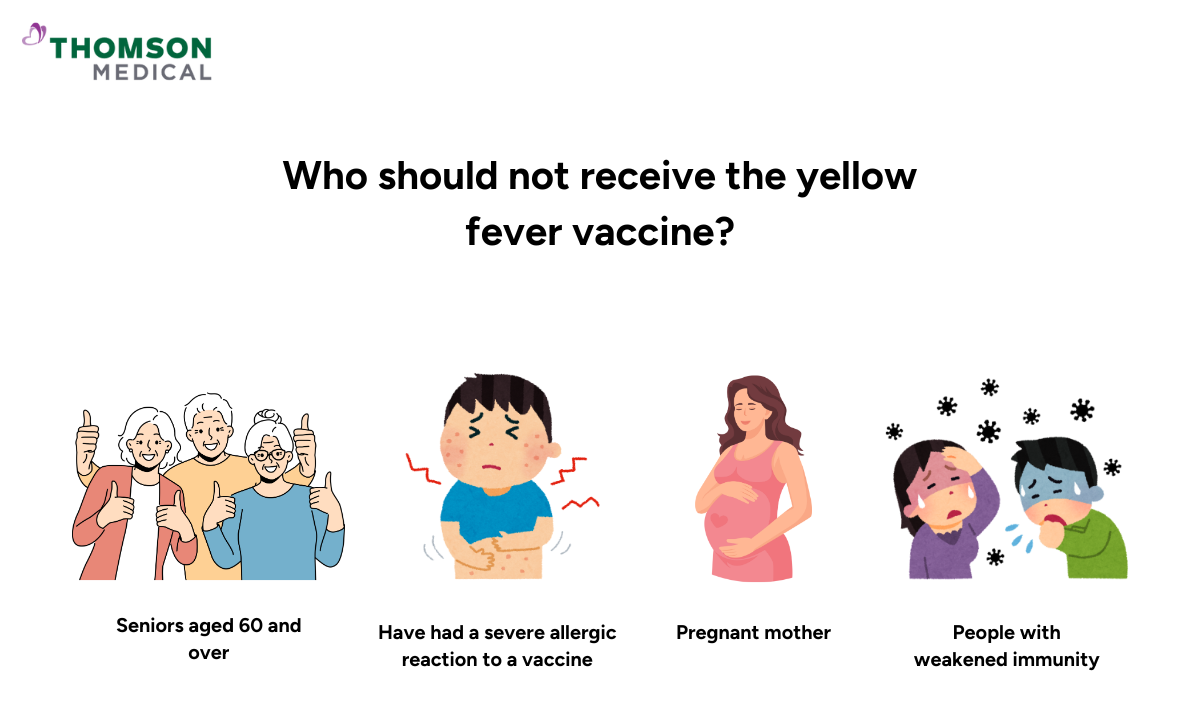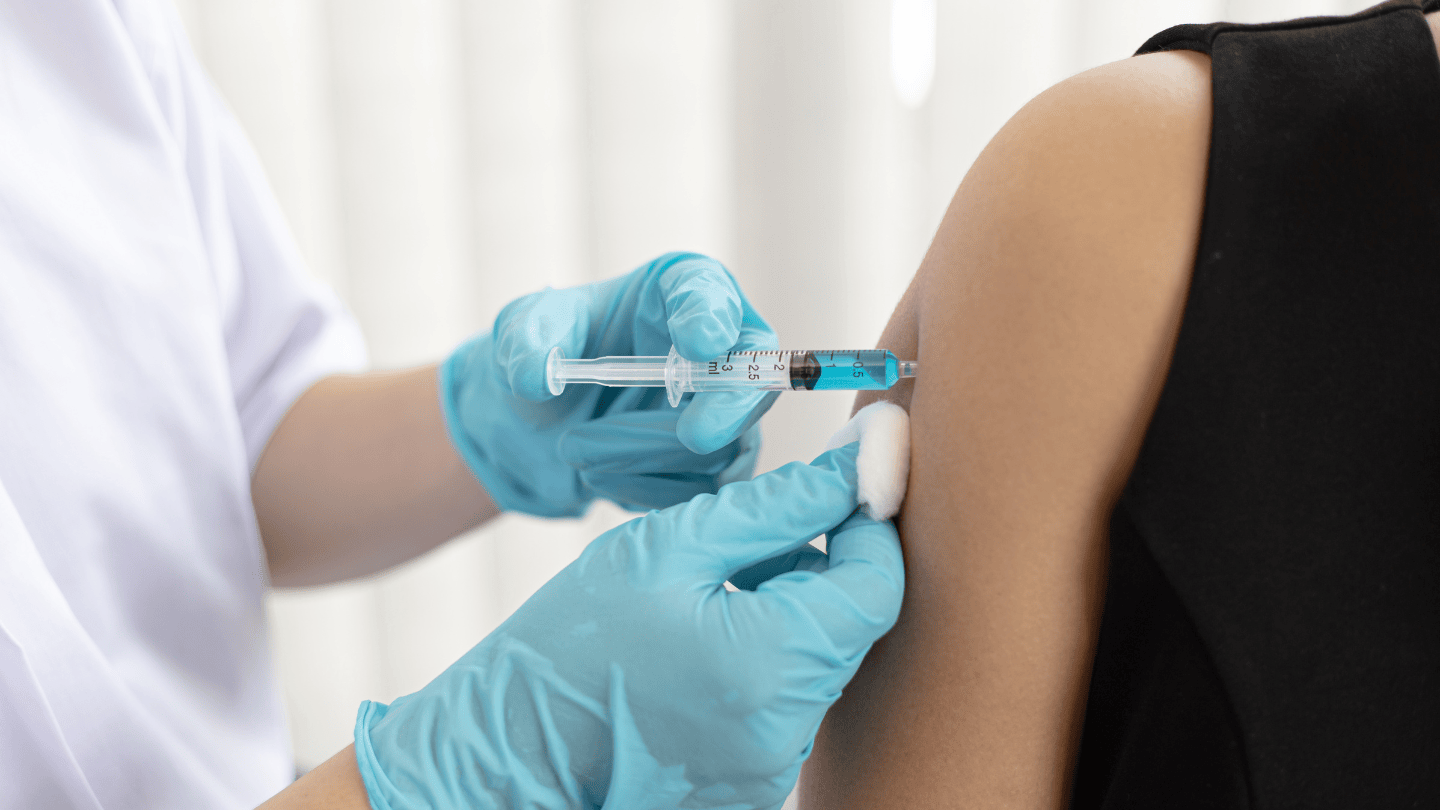What is yellow fever?
Yellow fever is a viral disease primarily transmitted by mosquitoes belonging to the Aedes or Haemagogus species. It usually causes flu-like symptoms, including fever, headache, muscle pain, and vomiting. However, in severe cases, it can lead to liver failure, jaundice (yellowing of the skin and eyes), and even a life-threatening condition.
Yellow fever is always present (endemic) in parts of sub-Saharan Africa, tropical South America, and Central America. Currently, there is no available cure for yellow fever. However, it can be prevented by getting vaccinated and protecting yourself against mosquito bites.
How does the yellow fever vaccine work?
To help protect yourself, vaccination is one effective way to do so. The yellow fever vaccine is a live attenuated vaccine, meaning it contains a weakened form of the virus. Once administered, the vaccine stimulates your immune system to recognise and fight the yellow fever virus.
After this encounter, your immune system will recognise the virus. So if you are exposed to yellow fever in the future, your body can quickly fight it off and provide immunity before you become ill.
Why do you need the yellow fever vaccine?
Since there is no targeted antiviral treatment for yellow fever, prevention is your only defence against this potentially fatal disease. The infection can progress rapidly and cause severe complications, including liver damage and bleeding. Vaccination provides strong immunity and is the safest way to protect yourself.When do I need the yellow fever vaccine?
Although Singapore is free from yellow fever, you'll need to get vaccinated to reduce the risk of importation of this disease from abroad. The vaccination is recommended for infants aged 9 months and over who are travelling to countries where yellow fever is present.
You should be vaccinated at least 10 days before travelling to allow enough time for your body to build immunity. After vaccination, you will be issued with a yellow fever vaccination certificate to present at the immigration counter of the respective country.
This vaccination certificate becomes valid 10 days after vaccination and remains valid for life. This is because, for most people, a single dose of the yellow fever vaccine provides long-lasting protection, and a booster dose is not required.
However, if you are planning to stay in countries where yellow fever is endemic for a prolonged period, you are at ongoing risk of exposure. In this case, you may consider getting a booster dose if it has been 10 years or more since your last vaccination.
Who should not receive the yellow fever vaccine?

Although the yellow fever vaccine is effective at preventing the disease, there are some cases where vaccination is not recommended. This is because the vaccine contains a live, weakened virus that can cause severe reactions in individuals with vulnerable immune systems. These include:
Infants under 9 months of age
Seniors over 60 years old
Pregnant or breastfeeding mothers
Organ transplant recipients
Those who have experienced a severe allergic reaction to a vaccine in the past
Those diagnosed with a thymus gland disorder that causes abnormal immune function
Those diagnosed with genetic conditions that cause a weak immune system (primary immunodeficiency)
Individuals using medications to lower the body's immune system, such as to treat autoimmune diseases
Individuals with weakened immune systems, such as people undergoing chemotherapy or who have HIV/AIDS
For further information on whether you're suitable for a yellow fever vaccination or a booster shot before travelling to countries with risk of yellow fever, request an appointment with Thomson Medical. Our specialists can help provide information on country requirements and ensure that you are properly protected for your journey.
However, if you are not suitable for the yellow fever vaccination but must travel to an endemic area, see your healthcare provider for a medical exemption letter and advice on strict mosquito protection measures.
How do you prepare for the yellow fever vaccine?
Before getting your dose of vaccination, there is no special preparation you need to do. However, there are a few important things you should inform your healthcare provider of beforehand, which include:
Any allergies you may have
Previous vaccine reactions (if any)
If you are pregnant or currently breastfeeding
All medications you are currently taking
If you currently feeling unwell or have fever
If you have any health conditions that affect your immune system, such as HIV/AIDS or cancer
Additionally, you need to make sure your immunisation records are up-to-date. So the doctor can check if you have had the yellow fever vaccine before and review your overall vaccination history. You also need to ensure that the vaccine is administered at least 10 days before travelling to allow the body to build immunity.
To help ensure the best results, it's recommended that you stay well hydrated and get adequate rest before your appointment. Please don't hesitate to ask your healthcare provider any questions you may have about the vaccination process or what to expect.
What to expect during the vaccination?
The yellow fever vaccine is administered as a single injection into the upper arm muscle. The vaccination itself takes only a few seconds, but you will then need to wait 20–30 minutes to be monitored for any allergic reactions.

Yellow fever vaccine cost in Singapore
In Singapore, the yellow fever vaccine is available at public and private hospitals and at some polyclinics. The price of a single dose generally ranges from SGD 230 to 270, depending on the provider and any additional services included.
After receiving the vaccine, you will be given a copy of the International Certificate of Vaccination, which becomes valid 10 days after the injection. This certificate is necessary for travel, as it is recognised internationally, and you may need to show it to officials in countries that require proof of a yellow fever vaccination.
Unfortunately, this vaccine is not covered by Medisave or the Community Health Assist Scheme (CHAS) in Singapore. However, some private health insurance plans may provide coverage, depending on the policy.
For detailed fee information and payment options, please consult your healthcare provider directly. Request an appointment with our specialists at Thomson Medical today for a detailed price breakdown and a personalised care plan.
What are the side effects of the yellow fever vaccine?
The yellow fever vaccine is generally safe and effective at preventing the disease. However, as it uses a weakened form of the virus to stimulate the immune system, you may experience some side effects, which usually last a few days.
These mild side effects are normal and indicate that your immune system is responding to the vaccine. Here are some common side effects of the yellow fever vaccine:
Mild fever
Headache
Muscle aches
Fatigue
Redness, swelling, or soreness at the injection site
However, while rare, some people may experience serious side effects that require immediate medical attention. If you experience any of the following symptoms, contact your doctor or seek emergency care:
Neurological issues, such as seizures.
Severe allergic reaction with difficulty breathing or swallowing (anaphylaxis).
Yellow fever vaccine-associated viscerotropic disease is a severe reaction that can affect internal organs and could be life-threatening.
FAQ
Do I need a yellow fever vaccination for Singapore?
No, yellow fever is not a risk in Singapore. However, all tourists and residents arriving from countries where yellow fever is endemic must show a valid yellow fever vaccination certificate on arrival.
The same applies to those who have spent more than 12 hours in airport transit in these high-risk countries. Those without a valid certificate may be quarantined or denied entry.
Which countries require proof of the yellow fever vaccine?
Many countries in Africa, such as Nigeria and Congo, and in South America, such as Argentina and Peru, require a valid vaccination certificate for entry. Additionally, some countries outside these regions may also require proof as a precaution.
As vaccination requirements can vary, remember to check the latest travel advisories or consult your healthcare provider before you travel.
Do I really need a yellow fever vaccination?
If you are travelling to areas where yellow fever is present, mainly parts of Africa and South America, you will often be required to have the vaccine. Yellow fever can cause severe and potentially life-threatening symptoms, and vaccination is an effective way to prevent it.
Additionally, some countries may deny entry or require quarantine if you cannot provide proof of vaccination.
How long before travel should you get the yellow fever vaccine?
You should get the yellow fever vaccine at least 10 days before travelling. This gives your body enough time to develop immunity and for your International Certificate of Vaccination to become valid for entry into countries that require it.
How long is a yellow fever certificate valid?
The International Certificate of Vaccination or Prophylaxis (ICVP) for yellow fever is valid for life, as the vaccine provides long-term immunity, typically following a single dose. This means that, regardless of when the certificate was issued, you do not need booster doses for travel purposes.
Is the yellow fever vaccine still available?
Yes, the yellow fever vaccine is available at public and private hospitals and polyclinics in Singapore. It is recommended for travellers aged 9 months or more who are visiting or transiting through countries where yellow fever is present.
This information is intended as general guidance only and should not be considered medical advice. To find out more about the yellow fever vaccine in Singapore and whether it is suitable for you, request an appointment with Thomson Medical
For more information, contact us:
Thomson Medical 24-Hour Urgent Care Centre (Novena)
- Call: 6350 8812
Notice:
The range of services, vaccinations, and tests may vary. Please contact us directly to enquire about the current availability.
Request an Appointment